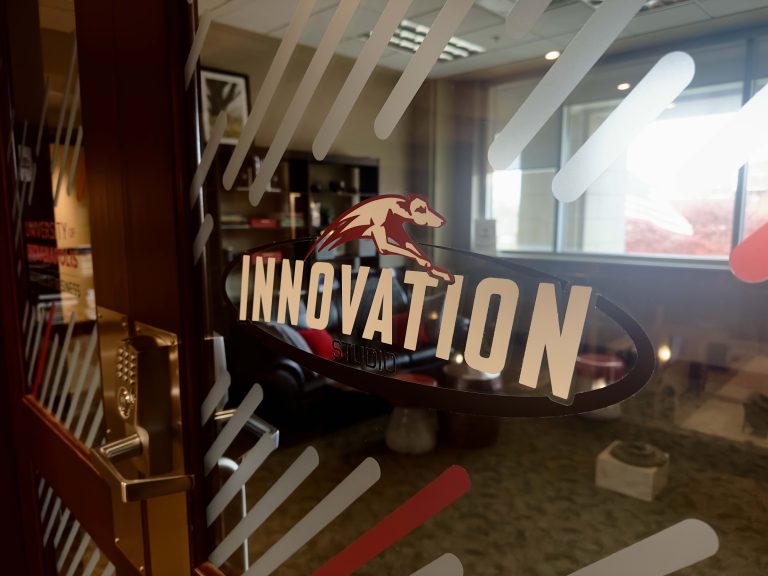
Following the completion of an undergraduate degree, recent graduates have a variety of possibilities ahead of them. They may choose to travel, work, relax or pursue a higher degree. For those planning to attend graduate school at the University of Indianapolis or elsewhere, there are various factors to consider and applications to complete.
Associate Vice President for Graduate & Adult Learning Enrollment Bethany Baugh helps undergraduate students through the graduate school application process. Baugh said that the earlier students start planning for graduate school, the better. That way, she explained, students can tailor opportunities and coursework during their undergraduate studies to the graduate program they hope to pursue.
“It’s never too early. Sophomore year is a good time to make sure that they are taking advantage of every opportunity during their undergrad to prepare for the graduate studies,” Baugh said. “It could be internships in your undergrad that are going to make your application to grad school that much stronger. It could be certain coursework, prerequisites that you might need to have for a graduate program. [You] want to make sure you’ve got those planned.”
Graduate school applications are often more competitive than undergraduate applications and require multiple components. According to Baugh, a standard graduate program application often includes a resume, transcript, Graduate Record Examination or equivalent test score, personal essay and two or three recommendations. Baugh recommended that while applying, students consider what qualities they will contribute to the program they apply for and emphasize those qualities as much as possible.
Baugh said that when students are trying to make their graduate school applications competitive, they should consider what is unique about them and what they will bring to the program if accepted. She recommended that students take advantage of internships and coursework that sets them apart from other applicants.
Not all graduate programs require applicants complete the GRE or equivalent test, but most do. For that reason, Associate Director Graduate and Adult Learning Enrollment Stephen Lewis said that students should prepare as well as possible for the exam, both financially and academically. Some applications, according to Baugh, cannot be processed without test scores, and she and Lewis both advised checking the application deadline for the program in question to decide what time is most appropriate for taking the GRE or equivalent test.
“The GRE, because it is rather expensive, I would say prepare for it. It’s not something like in high school when you took the SAT and ACT and you were like ‘I can take that a couple times,’” Lewis said. “Look at what the deadline is for the program that you’re applying to and then try to make sure that you’re in line with that. Don’t run it too close to the deadline, but make sure that you’re prepared to take the test.”
As for beginning the application process, graduate school applications are available online at the website of the university housing the program. According to Lewis, students should tailor their application materials to the program they are applying for, which is different than most standard undergraduate applications.
“There are probably different pieces when it comes to applying for a graduate program because [in] undergrad they’re looking at more of your high school background, unless you’ve had some college to transfer in, Lewis said. “Whereas graduate, we’re looking at your college. Some programs require a resume or a CV [Curriculum Vitae] of what you’ve done throughout your time and how it fits into their program. So it’s just more tailored to what the faculty is looking at.”
Although many students feel pursuing a master’s degree or Ph.D. is not worth the cost of attending school beyond undergraduate, Baugh said that she urges students to look beyond the initial costs and view graduate school as an investment.
“I think it’s important that we’re always learning and growing and grad school does that for you in a lot of different ways,” Baugh said. “So it’s not only about, ‘Do I have to have it?’ because you need to be licensed or you need to have a doctoral degree in order to even get the job that you want. It’s also about ‘How do I want to contribute?’”
Baugh said that students should not underestimate the advice faculty can give to students looking to apply for a graduate program specific to a given field. She also recommended that students utilize the Internet to find the type of job they want, see who occupies it currently, and research what jobs that occupant held or degrees that occupant earned before reaching their current level of employment.
Lewis echoed this sentiment, saying students who are unsure about whether investing in a graduate degree is necessary in their field should look into what degree is required by the career they want to pursue, taking into account geographic variations. For example, Lewis said, a student hoping to become a counselor may not have licensure outside of Indiana unless they pursue a higher degree.
“My advice would be [to] look at the career that you’re looking for. A lot of times, people just think ‘Oh, if I have a bunch of degrees, I’ll be fine.’ But the big thing now… is to look at the career that you’re wanting to get into,” Lewis said. “How much education do I actually need to achieve that degree, or achieve that position where I want to be?”
Advising centers in the Health Pavilion and Esch Hall are available to students considering graduate school or looking for more information on how to apply.








